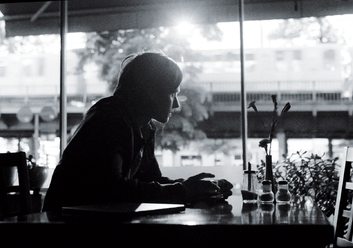
 “A Coffee in Berlin” chronicles a day in the life of young college dropout Niko (Tom Schilling); at its onset a day of no outsized significance but one that, through the accumulation of minor tragedies and major eccentricities, gradually takes on a shape and meaning, hinting that this day will force a shift in perspective for the adrift protagonist. The film is a German import, the debut of director Jan Ole Gerster, which cleaned up at the German Academy Awards, winning trophies for Best Film, Direction, and Actor. The film is shot in a smoky, nocturnal black and white and features a jazz soundtrack, two characteristics that put it squarely in the lineage of urbane hipness that dates back to “Breathless” and continues through mid-period Woody Allen to last year’s “Frances Ha,” perhaps the easiest and most apt reference point.
“A Coffee in Berlin” chronicles a day in the life of young college dropout Niko (Tom Schilling); at its onset a day of no outsized significance but one that, through the accumulation of minor tragedies and major eccentricities, gradually takes on a shape and meaning, hinting that this day will force a shift in perspective for the adrift protagonist. The film is a German import, the debut of director Jan Ole Gerster, which cleaned up at the German Academy Awards, winning trophies for Best Film, Direction, and Actor. The film is shot in a smoky, nocturnal black and white and features a jazz soundtrack, two characteristics that put it squarely in the lineage of urbane hipness that dates back to “Breathless” and continues through mid-period Woody Allen to last year’s “Frances Ha,” perhaps the easiest and most apt reference point.
Both “A Coffee in Berlin” and “Frances Ha” are comedies dealing with young people struggling to find a place in the world, loosely plotted and finding humor in small indignities and dislocations. But where Noah Baumbach’s film tends towards buoyancy and is so suffused with affection for Frances (Greta Gerwig) that it’s hard to doubt she’ll eventually be OK, Gerster’s film is more melancholy and less determinate – “A Coffee in Berlin” makes the audience judge for themselves the protagonist and his generation where the insights of “Frances Ha” often come fully-formed from the characters’ (and writers’) mouths.
The film begins with Niko waking up next to a woman - his girlfriend, though she’ll be his ex-girlfriend by the end of the scene. This brief moment marks the last time we’ll see Niko wanted by someone, living in a fixed role, but he soon sabotages it through his indecision and alienation. Niko is permanently out of place, a feeling visualized in the next scene as he goes to his barren new apartment, into which he has yet to unpack any boxes. He realizes he is late for a court-ordered meeting with a psychologist and rushes out the door. The meeting sets the tone for Niko’s day; it begins easily and according to script but then turns unsettling and antagonistic.
Fate continually thwarts Niko’s desire for coffee as his odyssey proceeds through a series of strange encounters. An alcoholic neighbor unburdens his despair onto Niko during their first meeting. His “Taxi Driver”-quoting friend Matze takes him to a film set where hacks slip easily into roles as Nazis while Niko struggles to find his own role. A former classmate with an axe to grind invites them to a performance art piece that Matze laughs through. He meets with his father and his father’s protégé at a golf course where his father confronts him with his discovery that Niko dropped out of law school over a year ago while continuing to cash tuition checks. When his father asks with disbelief what he’s been doing that whole time, Niko can only plaintively reply, “Thinking…”
“A Coffee in Berlin” poetically captures the universal feeling of youth adrift, but proudly localizes it in modern Berlin, a city it portrays beautifully, while still acknowledging the shadow its past casts over the present. The film doesn’t give easy answers, to do so would be untruthful to Niko, but it understands the depth of feeling behind his grasps at a different life.